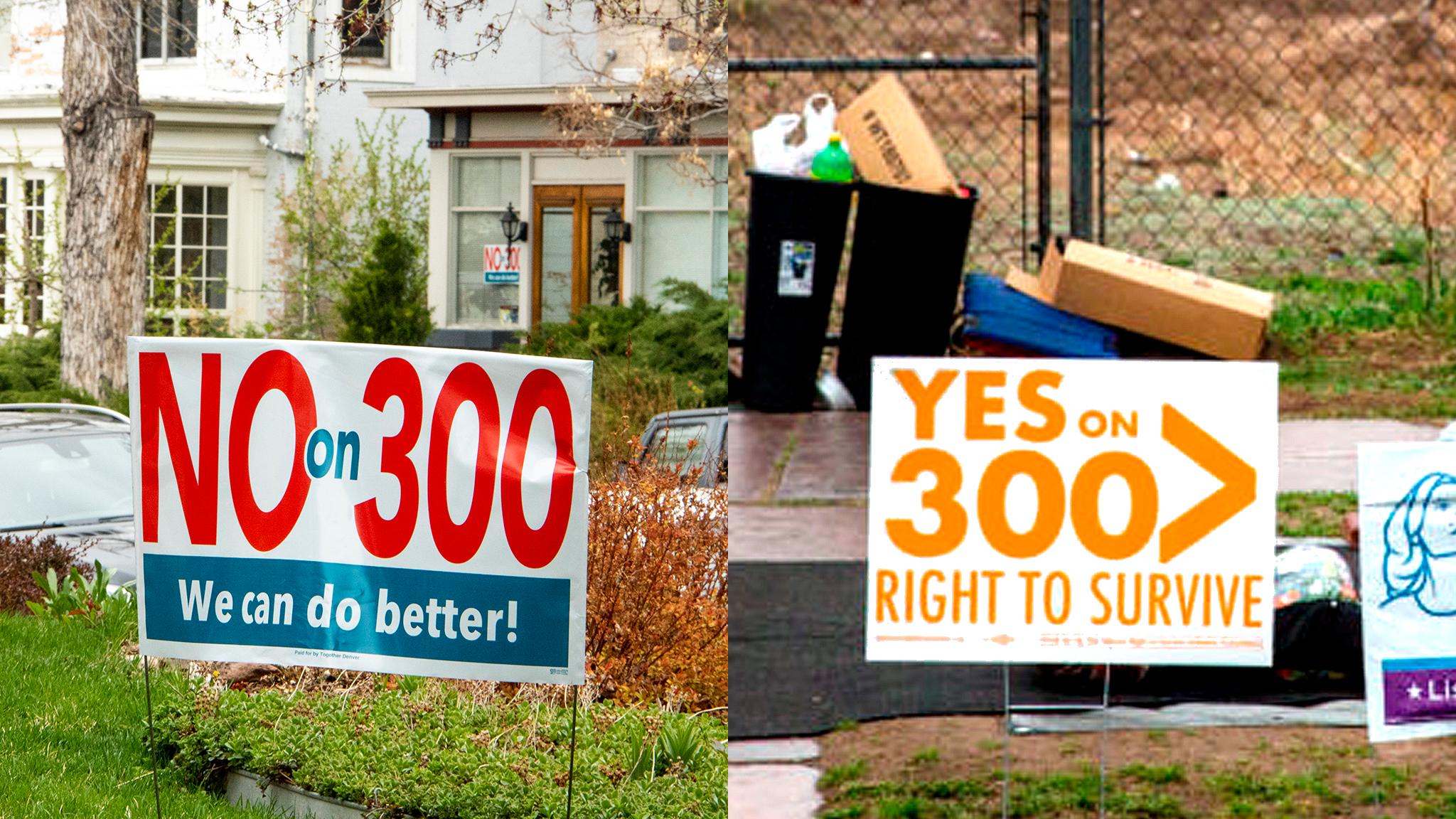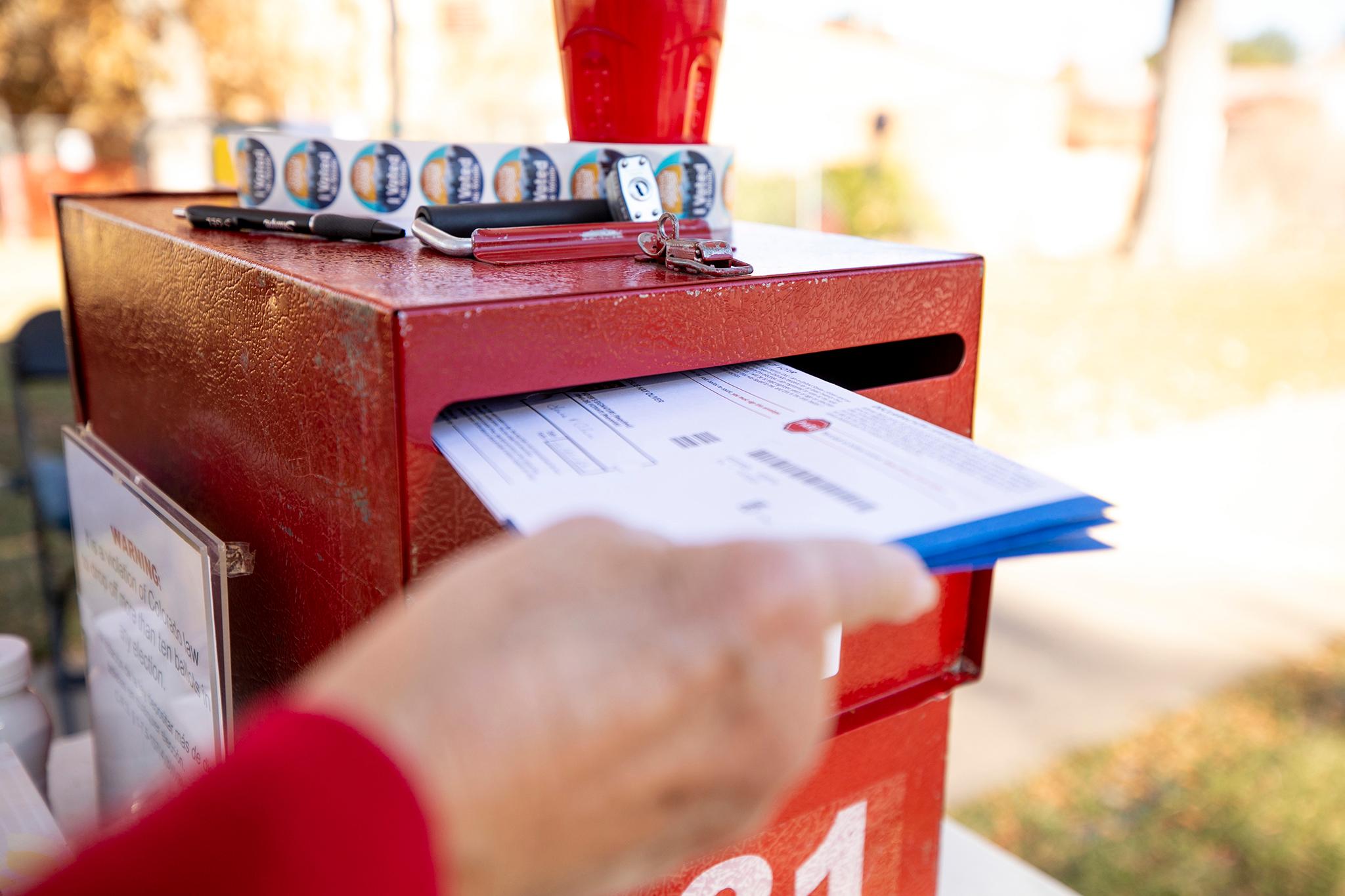In 2012 Denver's city council adopted a law banning urban camping.
Camping, the law on the municipal books specifies, "means to reside or dwell temporarily in a place, with shelter. The term 'shelter' includes, without limitation, any tent, tarpaulin, lean-to, sleeping bag, bedroll, blankets, or any form of cover or protection from the elements other than clothing. The term 'reside or dwell' includes, without limitation, conducting such activities as eating, sleeping, or the storage of personal possessions."
If Denver voters approve Initiative 300 on May 7, the municipal code would be rewritten to end the camping ban and another ordinance barring people from sitting or lying downtown except for overnight. The mayor would have to sign off on 300, also known as Right to Survive, but that's largely a formality. And in six months, the City Council would be able to weigh in to make tweaks.
The campaign debate has, of course, focused on what it will mean for the future if 300 does take effect. Proponents and opponents of 300 clash on many points, but agree at least that its passage would be significant for Denver.
Here's what the ballot language says: "Shall the voters of the City and County of Denver adopt a measure that secures and enforces basic rights for all people within the jurisdiction of the City and County of Denver, including the right to rest and shelter oneself from the elements in a non-obstructive manner in outdoor public spaces, to eat, share, accept or give away food in any public space where food is not prohibited, to occupy one's own legally parked vehicle or occupy a legally parked vehicle belonging to another, with the owner's permission, and to have a right and expectation of privacy and safety of or in one's person or property?"
If voters approve the proposal, an article would be added to a chapter of the municipal code that deals with human rights and anti-discrimination measures. The proposed article provides for the city government to enforce the change, declares illegal city rules and regulations that would prohibit the rights outlined in the ballot question and prohibits actions such as harassing people exercising those rights or police officers demanding to see the identification of people in public unless the officers have a reasonable suspicion of a crime.
Jerry Burton, a 57-year-old Marine veteran who has experienced homelessness on and off for at least a decade, believes people should have the right to camp in public if they choose. He said most of the people he has met on the streets don't want to be there -- they want homes, but not shelters, which he described as chaotic and unsafe.
"You've got ... drug dealers who prey on people in shelters," said Burton, who is an active member of Denver Homeless Out Loud, the advocacy group that led the petition drive to get Initiative 300 on the ballot and often shines a spotlight on the social and economic inequities that contribute to homelessness.
If 300 passes, Burton said the profound change wouldn't be visible. It would be in the minds of people without homes, who often are the working poor.
"They would have stability. They would have the comfort of not worrying about when, where, what time they (police) will come and push you around," Burton said. "It would give them the opportunity to be really rested so they can go to work."
Denver Homeless Out Loud argues that overturning the camping ban is a matter of protecting the basic rights of people living on the streets while it and other organizations work to ensure housing for all.
"We should be able to respect a person's choice and a person and show compassion," Burton said. "Whether it's May 6 or May 7, I'm still going to have the same passion about helping my people."
The word respect also comes up in a discussion of homelessness, camping and 300 with Ryan Cox, a mortgage broker who has lived in a home in Curtis Park for 12 years. He's seen people living in homelessness encroaching on private property, using alleys as toilets, disturbing their neighbors with noise and trash, and people living in homes jeering at those on the streets.
"If you don't feel part of the community, there's a lack of respect for the community," he said of people living in on the streets.
"Homeowners in the neighborhood don't respect the situation that many of these people (in homelessness) in the neighborhood find themselves in -- it's a difficult time in their lives," he said. "We can interact with the community better."
Cox opposes 300. He has seen the camping ban imperfectly and unevenly enforced, but believes it is a tool the city needs to respond when camps become large, unsanitary and unruly.
"Without that, there's no ability to affect behavior," Cox said. "Not to fear-monger, but there would be no control over if they ... set up in your tree, lawn or your park."
Cox, though, distanced himself from Together Denver, the group that according to its campaign finance report filed over the weekend has raised $2.3 million to defeat 300 in a campaign some have called divisive. Denver Homeless Out Loud has collected just under $100,000 in support of 300.
Alvina Vasquez, a spokeswoman for Together Denver, declined to be interviewed for this story, saying in an email that so close to Election Day, "we're really focused on educating voters and ensuring that people vote by 7 p.m. on Tuesday. "
Vasquez added: "If 300 fails, the Denver community still needs to address the very real issue of homelessness and how we can best work together to ensure our community is safe, welcoming and supportive for everyone. Those individuals and organizations that have been part of our coalition opposed to 300 will each have to decide what their role will be moving forward, but we hope and expect the conversation will continue."
In Curtis Park, Cox, who serves on the Homelessness Solutions Committee of his registered neighborhood organization, said the city needs more alternatives, such as tiny homes and perhaps authorized and serviced encampments. He described shelters as "massive warehouses."
Instead of just moving people around as has happened under the camping ban, Cox said the focus should be on "creating an environment where people can move forward without having a negative impact on our neighborhoods."
Service organizations like the Colorado Coalition for the Homeless agree. While expressing reservations about 300, longtime coalition president John Parvensky wrote in a guest commentary in The Denver Post in early April that the city should stop enforcing the camping ban unless public health and safety is threatened and put energy into expanding shelter beds and hours and making accommodations for people with possessions, partners and pets who have found shelters unwelcoming; getting more people into transitional and supportive housing where they can find mental health, employment and other support; and providing more outreach.
Later in April, Mayor Michael Hancock announced plans for a new Department of Housing and Homelessness to better coordinate and lead the fight to end homelessness. Hancock also announced that $15.7 million of city, business and philanthropic money will be spent over the next three years to provide more vouchers to move people into permanent housing, and for day shelters that will help provide 24/7 service. Perhaps the discussion sparked by the 300 campaign helped make that happen.
Cathy Alderman, the Colorado Coalition for the Homeless's vice president of communications and public policy, said the impact on already low morale among people experiencing homelessness could be hurt if 300 is defeated. But if it is approved and as a result homelessness becomes more visible, Alderman could see attacks on people on the streets as a result of increased tensions.
"Maybe I'm just being a worrier," Alderman said. "I worry if it passes. I worry if it doesn't."
In Los Angeles, officials allowed people to sleep on the streets in what was supposed to have been a temporary measure until the city and county were able to provide sufficient shelter and housing. Encampments -- and tensions around them -- have sprouted up in even wealthy parts of Los Angeles as the housing crisis there goes unsolved.
In Curtis Park, broker Cox said he drops in to speak to activist Burton regularly and sees his camp known as Jerr-E-ville, which has popped up at several Curtis Park corners over the years, as neat and orderly.
Weeks before the May 7 vote, though, a clean-up at the Denver Rescue Mission led people who had been sleeping on the pavement outside that shelter to move to Jerr-E-ville, then squeezed between two vacant lots at 27th and Arapahoe. Burton moved, saying the newcomers didn't mix well with the 20 or so tent-dwellers who had gathered around him and respected his policies of keeping the camp clean and relatively free of drugs and alcohol.
Cox attests that the bigger camp was a problem, saying he saw police confiscate a machete from a man there. Neighbors complained and police cracked down on campers at Jerr-E-Ville and elsewhere in Curtis Park. Burton's group was broken up and he was ticketed under the camping ban
Cox's and Burton's neighbors include organizations such as the Colorado Coalition for the Homeless, the Denver Rescue Mission and Samaritan House that provide shelter, food, health and other services for those who are struggling. Whatever happens May 7, on May 8 people experiencing homelessness, sometimes gathered in large camps, will still be drawn to Curtis Park. Cox said the concentration of homelessness in his neighborhood is likely to remain the case if 300 is approved, because Curtis Park is where people struggling to get back on their feet can find help.
Jeff Shoemaker, executive director of the environmentalist Greenway Foundation, is quoted in Together Denver campaign literature as saying: "Every park throughout Denver, including dozens of parks and open spaces adjacent to Cherry Creek and the South Platte River and its tributaries, will be negatively impacted."
Denver Homeless Out Loud acknowledges people who now go to shelters -- or at least try to refrain from covering themselves in public -- because of the camping law would take to tents if 300 passes. It's hard to imagine they would do so in numbers that would overwhelm the city in the way Together Denver has portrayed in its mailers and videos, but some might seek out quieter parts of the city. The annual point-in-time survey, while only an estimate and likely a significant undercount, does show homelessness trends that include a drop in numbers in recent years, from about 3,700 people without housing in Denver on a typical night in 2015 to about 3,400 last year.
Denver Homeless Out Loud disputes the idea that its intentions include allowing public areas to be overrun with trash, human waste and drug paraphernalia, saying nothing in 300 would keep officials from continuing to maintain sanitation and order in the city or from providing bathrooms and other infrastructure. Park curfews would continue to be enforced, according to Denver Homeless Out Loud.
The city attorney believes 300 is so broadly and vaguely written that consequences can be hard to predict, and ambiguities might have to be clarified in court. Would the clean-up at Denver Rescue Mission that led to unwelcome newcomers at Jerr-E-Ville have been possible if the changes proposed by 300 were in force? That and many other questions about 300 are hard to answer, said Ryan Luby, the public information officer for the city attorney. Police spokesman Sonny Jackson said that if 300 passes, his department would then consult with the city attorney on any changes to its practices, which now prioritize directing people living in homelessness to services rather than ticketing them under the camping ban.
Service organizations such as the Colorado Coalition for the Homeless have questioned whether their outreach workers might be accused of harassment under the changes to the law that 300 envisions. Terese Howard, who has helped lead Denver Homeless Out Loud's campaign for 300, said that is not the intent. When Denver Homeless Out Loud activists talk about harassment, it's generally in reference to police officers asking people on the streets to move along.
Howard said her organization is prepared to work with City Council if 300 passes. She said a good model is what happened after Denver voters in 2017 approved a green roofs initiative meant to combat global warming. An engineering study found that the vegetation coverings envisioned in the 2017 initiative would be too heavy for up to 95 percent of the city's buildings. City Council eventually adopted a compromise that offered property owners options: green space on the roof or elsewhere on the property, solar panels, enhancing the building's energy efficiency, or paying into a fund for green space elsewhere in the city.
No other city has taken the step Denver Homeless Out Loud is proposing Denver take. Howard said her organization knows the vote is being watched closely, not just for the result but, win or lose, for how 300 might shape conversations about addressing homelessness going forward.













